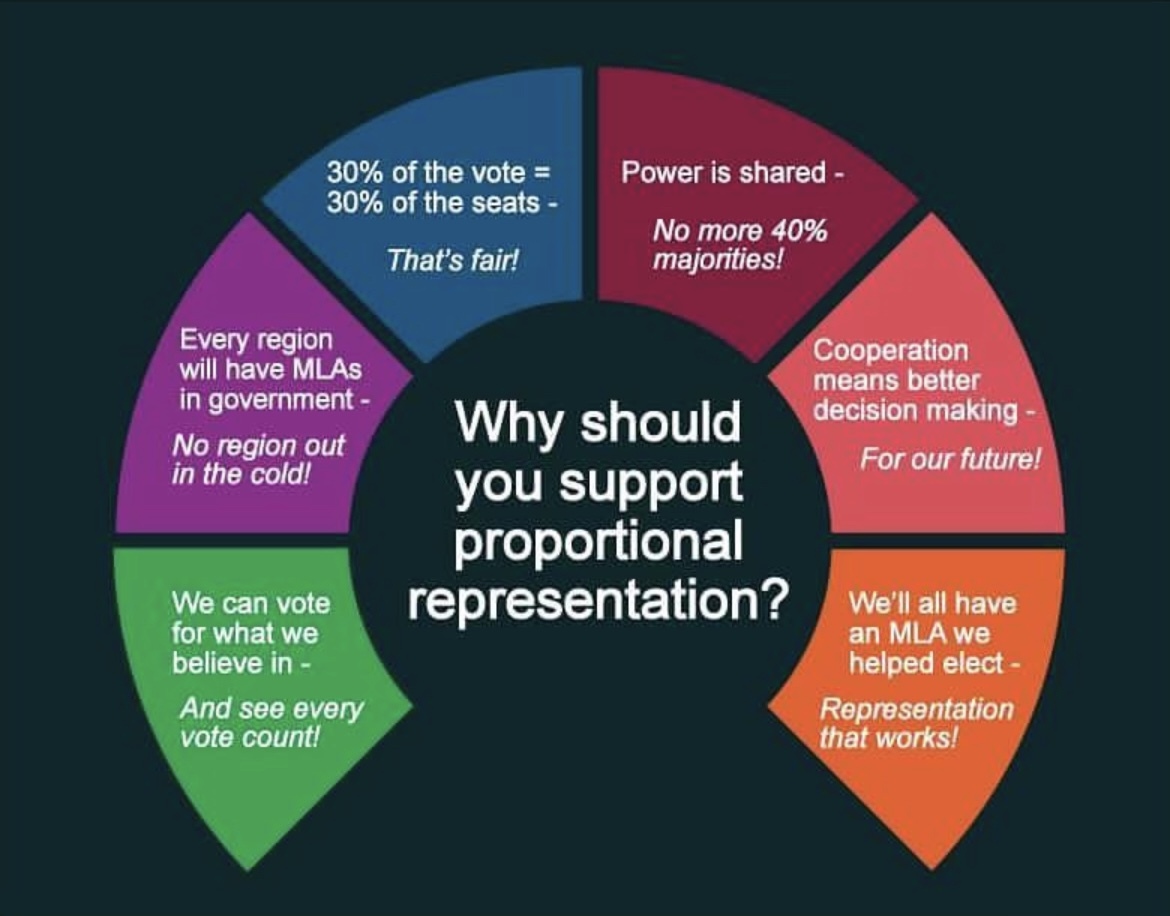Fairvote Canada
What is This Group is About?/De Quoi Parle ce Groupe?
The unofficial Lemmy movement to bring proportional representation to all levels of government in Canada.
Voters deserve more choice and accountability from all politicians.
Le mouvement non officiel de Lemmy visant à amener la représentation proportionnelle à tous les niveaux de gouvernement au Canada.
Les électeurs méritent davantage de choix et de responsabilité de la part de tous les politiciens.
- What is First-Past-The-Post (FPP)?
- What is Proportional Representation (PR)?
- What is a Citizens’ Assembly?
- Why referendums aren't necessary
Related Communities/Communautés Associées
Resources/Ressources
Official Organizations/Organisations Officielles
- Fair Vote Canada
- Fair Voting BC
- Charter Challenge for Fair Voting
- Make Votes Equal / Make Seats Match Votes
- FairVote US
- Make Votes Matter UK
We're looking for more moderators, especially those who are of French and indigenous identities.
Nous recherchons davantage de modérateurs, notamment ceux qui sont d'identité française et autochtone.
view the rest of the comments

Proportional representation
A useful facet of proportional representation is that it often results in you having multiple representatives (shared with more people) rather than only one ("Academics agree that the most important influence on proportionality is an electoral district's magnitude, the number of representatives elected from the district."). That means you are much more likely to have someone to represent you at least somewhat rather than having a 50% chance of having nobody to represent you. This has been a major selling point for electoral reform for a long time: https://www.youtube.com/watch?v=l8XOZJkozfI https://www.youtube.com/watch?v=bqWwV3xk9Qk
A TED-Ed video suggests that to "choose a defining fight" is useful. If people ask for "proportional representation" it would still be important even if we had an equal chance of ending up getting single member districts with STV or large electoral districts that elect multiple members with party-list proportional representation (list-PR)! With better representation, I expect we will find it easier to implement further improvements to state institutions.
I personally think "proportional representation" (PR) and "better representation" will be much easier terms to use to rally support than "single transferable vote" (STV) and "not having to worry about how anyone else is voting" (which would be assisted by having independence of irrelevant alternatives), since the meaning of the former is surely much clearer to the average person. STV / other voting systems with desirable qualities are good to advocate for, but it seems even "random dictatorship" is in some ways better than plurality voting (https://en.wikipedia.org/wiki/Ranked_pairs#Comparison_table), so I expect summarizing "improving the electoral system" with the term "proportional representation" will be more likely to make my life better than advocating for STV specifically.
Note that some implementations of party-list proportional representation violate voter's privacy ("In 2014 a German citizen, Christian Dworeck, reported this lack of secrecy in Swedish voting to the European Commission" (I suspect Israel uses a similar system: https://www.youtube.com/watch?v=wFbBuD32DqQ https://www.youtube.com/watch?v=c_IvDkWGqwI)), and I probably wouldn't specifically advocate for it. However, I will definitely advocate against having any electoral district elect only a single representative or using plurality voting. I can complain about party-list proportional representation, but I can't presently say it leads to worse representation than what we generally get in Canada or the USA.
Parties
My understanding about how political parties came about is that people started voting on bills in order to influence how people voted on other bills ("I'll support your bill if you support mine"), rather than considering each bill by its individual merits. An interesting phenomenon is that people also tend to dislike "omnibus" bills where a large number of changes result from a single vote, even though that at least formalizes the process of getting people to agree (it achieves the same thing but with one vote rather than several). These things seem to be hard to avoid, and parties provide other benefits due to being able to more efficiently provide certain benefits to multiple candidates at once, so I'm more focused on getting better representation with or without parties rather than focusing on parties specifically.
"In modern times the votes were unanimous" for electing the king of Germany or king of the Romans, and it seems to me that the point of having a representative nowadays is to empower someone who promises to vote in your interest, so it's a little confusing to me that people were/are surprised that people will make promises about how to vote in order to achieve their political goals.
Parties are quite ingrained in many electoral systems, so I think focusing on them rather than a more general criticism of poor representation will lead to less effective advocacy. Some entities I expect would be described as "parties" are even funded by the European Parliament: